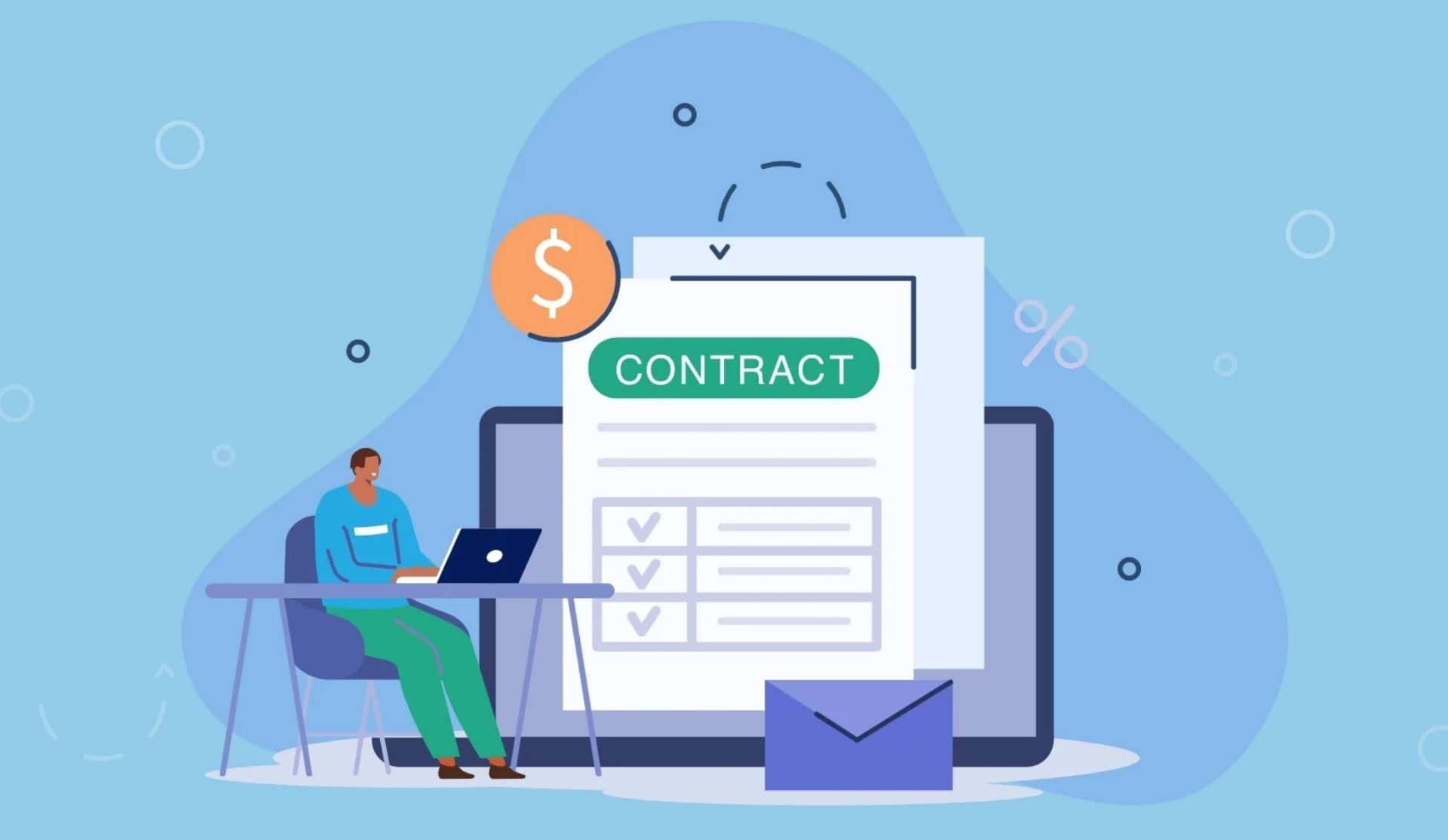
Guide to Successful Vendor Contract Management
Management of vendor contracts is one of the primary tasks of any workable business strategy. With businesses in the USA unable to function without external vendors providing goods and services, the options available through effective contract management would include smooth business operations, efficient cost management, and compliance with laws.
Vendor contract management consists of systematic supervision of the contract activities between clients and suppliers to ensure that the set terms and conditions are respected and both parties fulfill their agreement. This should be a clearly defined process from writing a clear contract to vendor performance monitoring, risk management, reachability, and communication between the concerned parties.
Table of Contents
ToggleWhat is Vendor Management?

Vendor contract management comprises the full supervision of the contracts with all the vendors from raising a request to negotiation, execution, and compliance; all the processes that need to be in place to ensure that vendors comply with such terms and conditions as well as to maintain good relations with the business.
The vendor contract workflow follows a similar pattern as any other contract process but requires additional flow action. These activities will include ensuring that like vendors have the same SLAs and applicable contractual conditions. Everything will be monitored strictly, especially when it comes to the deliverables such as cost, quality, and timing. It would be also wise to compare these deliverables to the original SLAs to verify that they were met on the suppliers’ end. The other main element of effective vendor contract management is counting on the regular reporting of vendor performance.
Why Is It Important to Manage Vendor Contracts?

Contracts for vendor management can bring compliance with regulatory obligations and good relationship management between the organization and its suppliers. This usually is the set of vendor agreements wherein good quality input materials from the vendor will be guaranteed, as per schedule, and on terms acceptable to the organization. Hence signing a vendor agreement gives the organization protection against potential issues as to value for money, risk management, and regulatory compliance.
Vendor contract management will assist in identifying possible shortcomings of a vendor in terms of financial stability, insurance, and risk anticipation. With adept vendor contract management, organizations can comfortably remain aware that they are not paying 220% for substandard products. Sound vendor contract management can also save organizations from the embarrassment of legal action such as fines should they fail to satisfy system requirements.
In the public sector, needless to say, in California, vendor contracts in the public sector are regulated in such a way that contracts must be awarded to the lowest responsible bidder and must meet qualification and certification criteria. Thus, for companies to avoid legal trouble and maintain a good commercial relationship with suppliers, a good vendor contract management system is essential.
Streamlining vendor contracts focuses on risk mitigation, cost control, regulatory compliance, and extending vendor performance. Through the implementation of effective vendor contract management, firms can realize savings, increase operational efficiency, and strengthen vendor relationships. In a competitive environment, the upper hand in contract management capability can provide firms with a competitive edge.
Vendor Contracts Types

- Fixed-price contracts are suitable for low-risk purchases from reputable suppliers because they ensure that goods and services are made available with no great change coming from the market.
- Cash reimbursement contracts are suitable for riskier or less certain transactions as they allow for extra costs that may arise in the execution of the contract to be covered by the purchaser.
- Hourly contracts normally cover different types of professional services such as consultancy services and freelancers’ work.
- Indefinite contracts, mostly used when no particular deliverables are given, set a time from minimum to maximum allowances for an unknown quantum or time.
Steps for a Successful Vendor Contract Management

Determine The Needs of The Vendor
Knowing what exactly is needed by an organization or business is extremely important to effective vendor management. The very first thing that should be determined is the specific products or services being procured, and the second is to be aware of suppliers in the area. The next critical assessment is: “Will this particular vendor be able to meet the needs of the organization?”.
Contracts must cover all of the important basics before any vendors are locked in, which establishes clear expectations and understanding of the terms of service. In addition, while developing a vendor contract management system, the selection of trustworthy vendors is paramount. Customer feedback should be examined while balancing price and quality. The reliability and promptness of a vendor must also factor in their delivery. These inputs will help to create good partnerships for organizational success.
Establish Expectations and Responsibilities Clearly
Thus, the vendor management practice requires clarity about vendors and their contracts. It must be explicit about who is fully responsible for each specific task and deadline. Also, it should mention possible mitigation in case of any omission of those responsibilities. All this could be put in a contract, thus minimizing doubts between the vendor company and the principal user and bringing them closer.
Form a team to monitor vendor contracts
Determining the organization’s needs is then the first step towards assembling a good vendor contract management team. Such a team should include individuals from procurement, legal, and finance; or one person can manage all these if need be. Their main work would be the manipulation of vendor contracts, negotiating, and ensuring vendor performance to an agreement.
It’s really important to clearly define what each team member will be responsible for in terms of vendor contract management, as that would make things run more smoothly while also keeping them accountable.
Create a Plan for Managing Vendor Contracts
The successful management of vendor contracts entails a well-thought-out plan. The plan should contain clear instructions on how to handle a variety of contract-related activities, such as review and renewal as well as dispute resolution and vendor evaluation. With an idea of industry best practices, it can be helpful to consider the number of vendors that they have and the products and services they require. It is also important to be sure to consider their business’s needs when considering what products and services they might need.
Keep A Careful Eye on Vendor Performance
The successful management of vendor contracts entails a well-thought-out plan. The plan should contain clear instructions on how to handle a variety of contract-related activities, such as review and renewal as well as dispute resolution and vendor evaluation. With an idea of industry best practices, it can be helpful to consider the number of vendors they have and the products and services they require. Be sure also to consider their own business’s needs when considering what products and services they might need.
Make a Contract with The Vendors

Drafting an appropriate legal document for the requirements in managing vendor contracts is also an important step. Either through hiring a lawyer to prepare the document or just using a ready-made template. Hiring a lawyer may be quite handy and reliable and it may also save some future money. On the other hand, templates are faster and more economical usually taking about 10 minutes or so and much less trouble than hiring a lawyer. Either way, it will be an option but it is important to ensure that it is legally binding in the state. Comfort and preference are generally decided by the choices of what they make.
Put the Vendor Contract Management Strategy into Action
Once acquiring a vendor, the team, and a vendor agreement that clearly states the requirements; signing a contract with them is the next step. Also ensuring that the contract contains the mention of routine check-ins, reports, responsibilities, and the manner of conflict resolution. This will keep the machinery running smoothly.
Make a Repository for All Vendor Contracts
To monitor the ongoing performance of contracts, it’s good practice to gather all vendor contracts in one centralized digital location. Doing so allows for the monitoring of contracts and their due dates to make it easier to hold vendors accountable and ensure timely payments.
Keep a Thorough Record of Every Vendor Contract
To keep track of multiple contracts, a solid master record must be developed for all active agreements. This record should contain all important information relating to deliverables, pricing, renewal, or expiration dates. This can be achieved easily with contract lifecycle management software. With regular updates to this master record, the latest information is at hand, and managing and keeping track of the contracts becomes quite easy.
Keep An Eye on And Assess the Vendor Contract Management Strategy
Sustained monitoring of key performance indicators (KPIs) is indispensable for effective vendor contract management. Monitoring vendor performance and cost savings enables organizations to determine how effectively vendor relationships are functioning. This continued evaluation allows for timely modifications to the management plan to ensure consistent alignment with organizational goals and objectives. By focusing on these metrics, organizations can then improve their decision-making framework and optimize vendor management practices.
Stay Flexible and Agile
Vendor contracts are among the processes that need to take account of aspects that cannot be foreseen. The agility of responding to vendors who cause delayed execution of an agreement is of utmost importance. Due to changing market conditions, an operation may need to accommodate amendments, showcasing the operative value of agility in contract management. This supply chain goes on and off the road most of the time; therefore, being flexible and responsive is not good but rather necessary.
Just in Case, Develop a Risk Management Plan
Agility can be optimized with a very well-prepared plan for risk management regarding any form of potential threat. This translates to having a backup plan, which is where alternative suppliers come into play. Any changes needed in operations have to be in accord with this plan. It should be a general approach across all contracts but tailored to meet the specific venture of each vendor.
Make the Contract Workflow Automatic
Contract Workflow Automation eliminates the internal factors causing problems and reduces human errors. It keeps everyone involved updated about the progress throughout the process making it less likely for any problems to arise concerning the contract.
Why It Matters

Effective contract management has a huge financial impact because it could save huge money and improve the financial performance of organizations. Simplifying contract management processes could lead to an organization having increased efficiency, which increases productivity overall.
In addition, proactive contract management is important for risk management since it enables organizations to identify and mitigate potential risks before their adverse effects on operations. This comes with the added benefit of having a solid and transparent vendor relationship, which in turn translates into better service delivery and enhanced collaboration for the organization.
Conclusion
Vendor contract management is an important part of running a business in the United States. Businesses must implement strong contract management practices to reduce risks, regulate expenses, comply with legal standards, and optimize vendor performance. The entire process leads to financial gains, operational efficiencies, and better vendor relationships.
A strong contract management system gives companies the confidence necessary to deal with all the complexities of vendor interaction, so all parties will comply with their responsibilities and the business runs smoothly. The ability to handle vendor contract management has become very important to gaining strategic advantages in today’s aggressive market conditions.
The focus now should be on creating a beneficial environment in which the business and its vendors succeed, thus achieving long-term success and growth. Investing heavily in vendor contract management arms businesses with tools for achieving their respective strategic goals and keeping a competitive edge in the market.
